

What is the travel rule for cryptocurrencies?
I've heard it affects users…
With the introduction of the travel rule in June 2023, some restrictions have been placed on withdrawals from exchanges.
The address and wallet information of the sender and receiver of cryptocurrencies are collected, and the information is stored by the exchange.
This article will explain the impact of the travel rule and how to avoid it in an easy-to-understand manner.

Summary of this article
- With the introduction of the travel rule, it has become necessary to register the sender and receiver information when withdrawing cryptocurrencies from exchanges, and this information is stored by the exchange.
- Cryptocurrencies cannot be sent directly between exchanges that use different information notification systems.
- Your own and the recipient's information is now stored by exchanges, which contradicts Bitcoin's characteristic of not being tied to any country or third party.
This article was written in Japanese and converted to English using a translation tool.
Date of writing (Japanese version): February 2024
What is the Travel Rule?
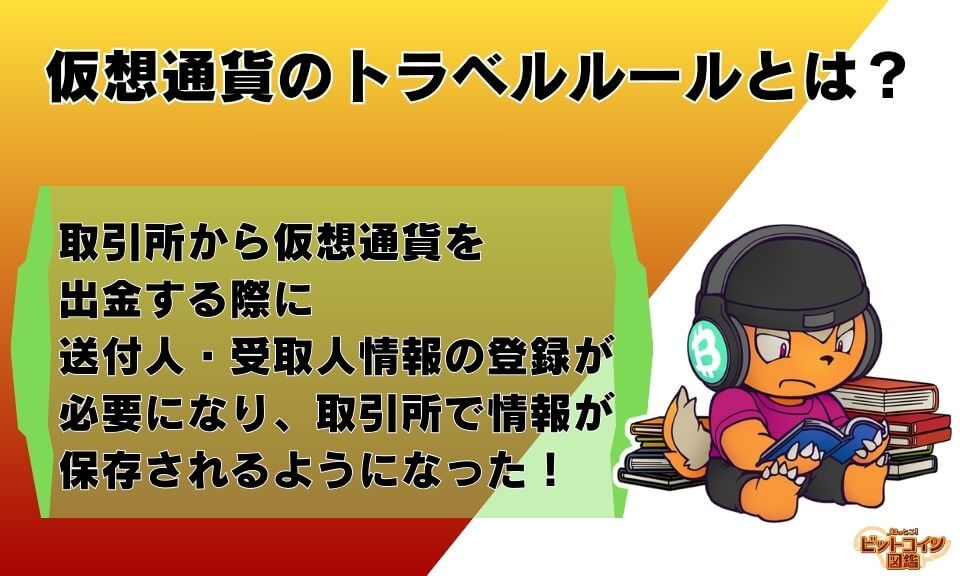
The travel rule is a regulation that requires the sending exchange to notify the receiving exchange of customer information when a user sends cryptocurrencies. It was introduced in June 2023 to combat money laundering and terrorist financing.
Reference:暗号資産・電子決済手段の移転に係る通知義務(トラベルルール)
The FATF (Financial Action Task Force), which promotes international standards, recommends that FATF member countries incorporate the travel rule into their regulations. The application of the travel rule varies by country, and in Japan, the JVCEA (Japan Virtual and Crypto assets Exchange Association) leads the self-regulation.
Information to be provided at the time of transfer
- Recipient's name and address
- Whether the recipient's cryptocurrency exchange exists and its name
- Purpose of the transaction
*The recipient's exchange is notified of the sender's information (name, address, crypto asset address) and the recipient's information (name, crypto asset address).

The information provided at the time of transfer is stored by both the sending and receiving exchanges. I've heard that there are other impacts due to the travel rule…
The implementation of the travel rule has imposed restrictions on transfers between exchanges.
For example, you cannot send cryptocurrencies from Bitflyer to GMO Coin.


What?! It seems odd that even though they are both Japanese exchanges, some exchanges don't allow Bitcoin transfers.
If you need to send to an exchange that cannot receive directly, you can bypass the restriction by first sending to your own wallet.

The Travel Rule transfer restrictions can be bypassed using wallets
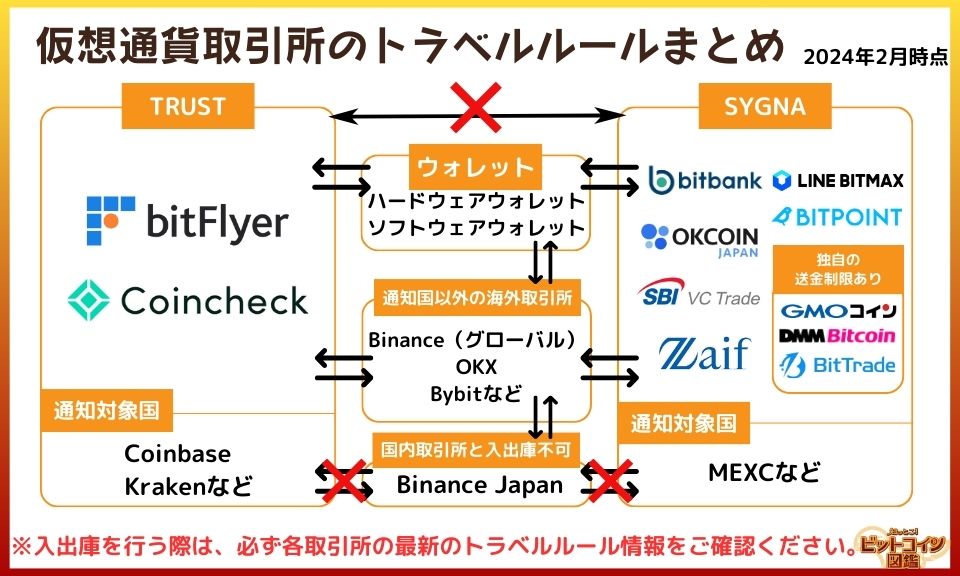
By using a "private wallet" to manage your own cryptocurrencies, you can send cryptocurrencies to exchanges that cannot receive directly due to the travel rule. You cannot send cryptocurrencies directly between exchanges that use different information notification systems, such as "TRUST" and "SYGNA," but you can work around this by using a wallet.
*Note: SBIVC Trade and BitPoint have started supporting both SYGNA and TRUST.
Private Wallets (Wallets where users manage the private keys)
- Hardware wallets: Ledger Nano, Trezor, Cold Card, etc.
- Software wallets: Metamask, Phoenix, etc.
Example: In the case of Bitbank (SYGNA)
- Can send to GMO Coin (domestic exchange using SYGNA)
- Can send to MEXC (overseas exchange: notification target country using SYGNA)
- Can send to Bybit (overseas exchange: non-notification target country)
- × Cannot send to Bitflyer (using TRUST)
Notification target countries/regions (where the travel rule is applied)
United States, Albania, Israel, Canada, Cayman Islands, Gibraltar, Singapore, Switzerland, Serbia, South Korea, Germany, Bahamas, Bermuda, Philippines, Venezuela, Hong Kong, Malaysia, Mauritius, Liechtenstein, Luxembourg
(Future additional jurisdictions)
United Arab Emirates, India, Indonesia, UK, Estonia, Nigeria, Bahrain, Portugal
Source:トラベルルールの対象法域について|金融庁(surveyed on February 13, 2024)

It's inconvenient that you can't send directly between exchanges, but it's good to know that you can manage by using a wallet.
Make sure to check the latest information from each exchange about the details of the travel rule.

Disadvantages of the Travel Rule Explained Clearly
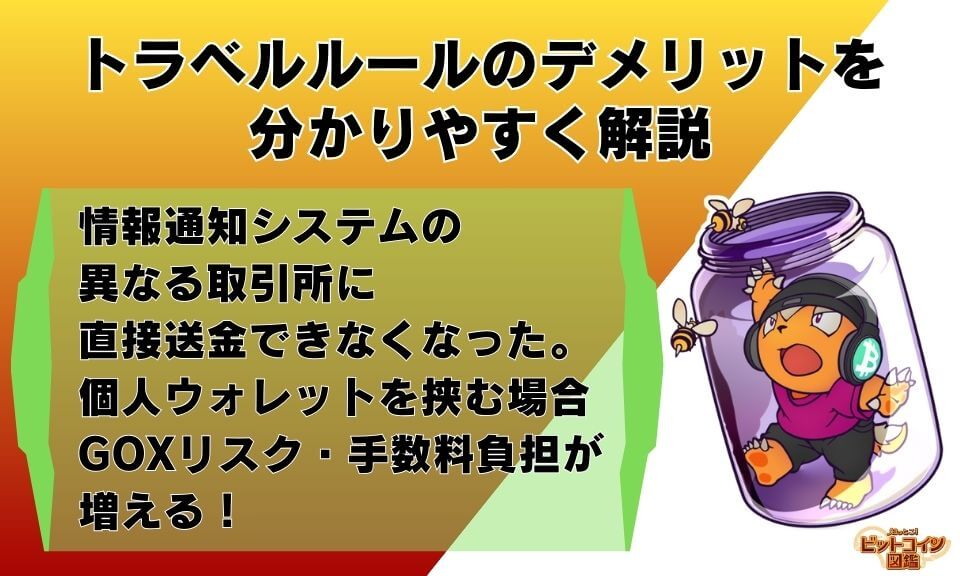

The travel rule seems inconvenient and might have some drawbacks…
Let me introduce some important points you should be aware of regarding transfers related to the travel rule.

Inability to Freely Transfer Between Exchanges
With the introduction of the travel rule, it has become impossible to send cryptocurrencies directly between exchanges with different notification systems.
For example, you cannot send cryptocurrencies between Coincheck, which uses the "TRUST" notification system, and Bitbank, which uses the "SYGNA" notification system. Moreover, even between Coincheck and Bitflyer, which both use the same system, transfers of cryptocurrencies like Ripple (XRP) and Stellar Lumens are restricted.
Current Travel Rule Compliance of Exchanges (as of February 13, 2024)
TRUST Implementers
- Bitflyer
Reference:トラベルルール導入後に暗号資産が送付可能なケースは何ですか? - Coincheck
Reference:【トラベルルール】暗号資産の送金・受取に関する詳細について
*Transfers between TRUST-compliant exchanges are limited to BTC, ETH, ERC-20 tokens, etc.
SYGNA Implementers
- Bitbank
Reference:暗号資産の直接送付ができない暗号資産交換業者 - SBIVC Trade
Reference:【重要】トラベルルールへの対応について - OKcoinJapan
Reference:入庫・出庫が可能な取引所はどこですか - Zaif
Reference:【重要】トラベルルール適用に伴う対応(更新) - LINE BITMAX
Reference:トラベルルールについて - Bitpoint
Reference:暗号資産入出金に関するトラベルルールへの対応について - GMO Coin
(*Even if compliant with SYGNA, cannot send to overseas notification target countries)
Reference:トラベルルール対応についてのお知らせ - DMM Bitcoin
(*In addition to the travel rule, has restrictions on transfers, possibly unable to deposit or withdraw to Binance, Bybit, MEXC, Bitget, etc.)
Reference:暗号資産入出金時のトラベル・ルールについて
Reference:暗号資産(仮想通貨)の入出金依頼について - BitTrade
(*Mentions "We cannot accept withdrawals to wallets managed by foreign cryptocurrency exchanges that are not registered with us.")
Reference:トラベルルール対応について
Note: Binance Japan
- Uses "GTR" notification system, cannot withdraw to domestic exchanges
- Cannot withdraw to exchanges in notification target countries
Reference:トラベルルール等の導入に伴う当社の対応について

It seems that it can be difficult to determine which notification system an overseas exchange uses.
Some domestic exchanges also state that "if the cryptocurrency transfer cannot be reflected, the cryptocurrency cannot be returned."
It's important to perform a small transfer test to confirm if it can be sent.

Extra Transfer Fees
When bypassing the travel rule by using a personal wallet, an additional transfer step is required. This results in extra Bitcoin fees or altcoin gas fees.
With an additional transfer step, there is also a higher risk of GOX (losing coins by sending to the wrong address).


It also means more waiting time until the coins arrive, so it's an inconvenient rule for users…
Does the Travel Rule Help Prevent Money Laundering?

The Travel Rule was introduced to prevent crimes such as money laundering, so is this unavoidable?
There are voices questioning whether the travel rule truly helps prevent money laundering.

Considering global criminal activities, it's unclear whether Japan's travel rule will effectively prevent money laundering and terrorist financing.
Here are some examples of criminal methods used so far.
Criminal Methods (Examples)
- Buying and using accounts from others
- Using overseas exchanges with lax KYC regulations
- Using decentralized exchanges (DEX)
- Using mixing services (mixing coins from multiple users and redistributing them to different addresses to make tracking difficult)
- Using privacy coins (Monero, Zcash, etc.)
*These examples are provided for informational purposes and do not encourage or endorse money laundering.

Indeed, if someone is really bad, they might find various loopholes.
Japan has implemented the travel rule early, but there's a difference in how it's adopted globally, and it's not yet uniformly enforced.

Problems with the Travel Rule
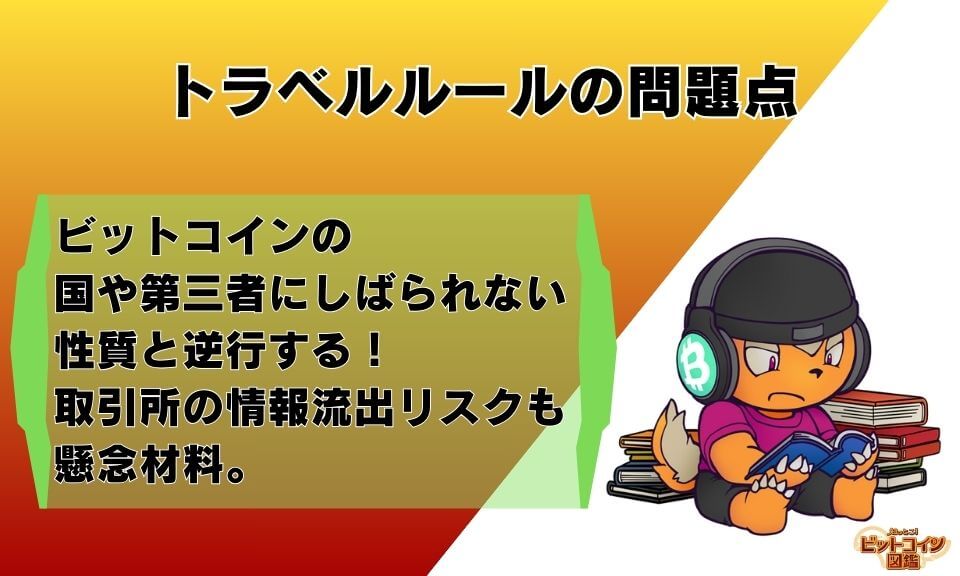

Are there other issues with the travel rule that I should know about?
Here are some concerns that have been raised.。

Contrary to the Nature of Bitcoin
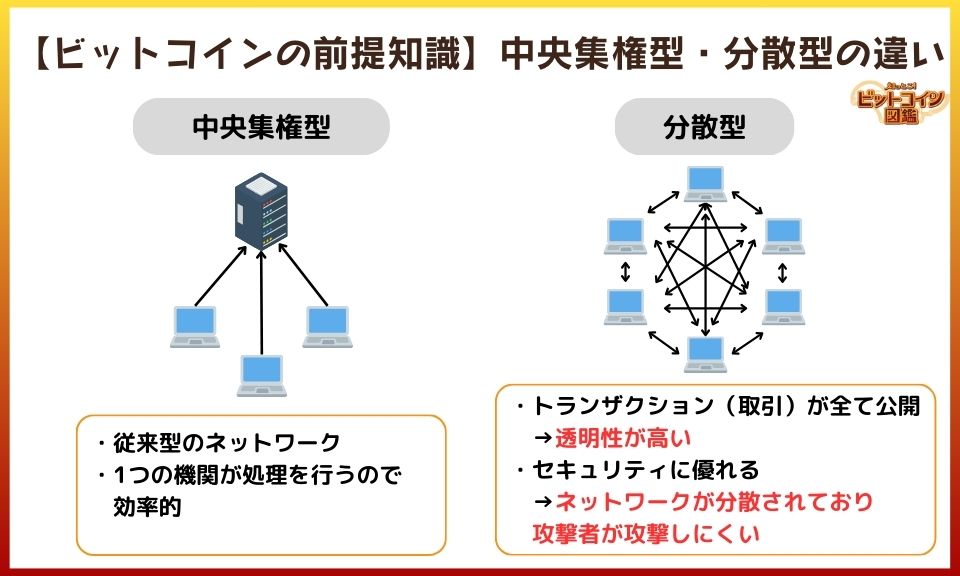
Bitcoin is a decentralized currency with no central authority, allowing direct transactions between individuals without third-party restrictions. However, the travel rule imposes restrictions on transactions between exchanges, which goes against Bitcoin's nature of being free from governmental or third-party control.
Bitcoin was designed to be a free and open financial system, free from centralized control and regulation.
The travel rule does contradict Bitcoin's core characteristics.


Regulations might hinder Bitcoin's technological innovation…
It's a bit worrisome.
Risks of Exchange Information Leaks
With the implementation of the Travel Rule, exchanges sending cryptocurrency must now collect additional information about the recipient, such as their name, address, and wallet address. Similarly, exchanges receiving the cryptocurrency must store all the required information.
When cryptocurrency is sent, the sender's name, address, wallet address, and the amount sent are linked and stored at the exchange. If the exchange experiences an information leak, users are at increased risk.
Examples of Corporate Information Leaks
- NTT Business Solutions (about 30,000 personal information leaks / 2024)
…An employee dispatched to the company illegally took out personal information and sold it to a list broker. - Tokyo Verdy Co., Ltd. (about 2,700 credit card information leaks / 2024)
…A system administrator's account was misused, and the payment form was tampered with. - Coinbase (about 6,000 accounts attacked / 2021)
…User accounts were accessed illegally, and cryptocurrency was withdrawn without authorization. - PayPay Corporation (up to 20 million pieces of information possibly leaked / 2020)
…A security setting error allowed external access, leaking information about PayPay merchants, including addresses, sales deposit destinations, and transaction histories. - LINE Corporation (over 4,000 unauthorized logins / 2020)
…Over 4,000 accounts were hijacked, resulting in phishing activities through impersonation.
Reference:個人情報漏洩事件・被害事件一覧|Cyber Security.com
There have been many incidents of information leaks by companies and municipalities, with over 100 cases in 2023 alone*.
*Cases with more than 1,000 victims.


Companies experience information leaks for various reasons, such as attacks on administrator accounts, phishing attacks on employee emails, and insiders taking out information.
In the field of security, there's a term called "5-dollar wrench attack," referring to the threat of physical violence to steal assets.
Some criminals targeting Bitcoin resort to physical violence to steal it.


It's a bit scary to think that my name and address, along with my wallet address, will be stored together.
The more Bitcoin you have, the higher the risk, and the more worrying information leaks become.
Potential Increase in Fees
To comply with the Travel Rule, cryptocurrency exchanges need to implement new systems and continuously manage them, increasing operational costs.
To cover these expenses, they may increase fees, spreads, and other charges levied on users.

Related work might increase due to the Travel Rule, leading to higher labor costs as well.
Maintaining systems to protect user personal information costs money, and the Travel Rule is a significant regulatory burden for exchanges.

How to Bypass the Bitcoin Travel Rule

I want to know how to send Bitcoin to an exchange that is affected by the Travel Rule and cannot receive funds.
Well, you can send it by using a wallet as an intermediary…
But perhaps it's worth reconsidering the idea of "sending Bitcoin to an exchange that is affected by the Travel Rule."

Methods to Send Bitcoin to Exchanges Affected by the Travel Rule (Examples)
- Use a wallet as an intermediary for exchange-to-exchange transfers
→ Use hardware wallets or software wallets - Use exchanges with the same information notification system
→ Check whether the exchange uses TRUST or SYGNA before opening an account - Send via another cryptocurrency
→ If you have a preferred wallet, use a cryptocurrency supported by that wallet for transfers
Wallets for Managing Bitcoin
- Hardware Wallets
Ledger Nano, Trezor, Cold Card - Software Wallets
Phoenix (Lightning-focused mobile app)
Blue Wallet (On-chain focused mobile app)
Sparrow Wallet (Advanced users, integrates with hardware wallets)
*Custodial wallets like Wallet of Satoshi can also store Bitcoin. However, these are not private wallets (the private keys are managed by the operator), so they do not qualify as personal wallets.
When withdrawing Bitcoin from a cryptocurrency exchange, there will be withdrawal fees, so depending on the use case, you might lose out on fees.


Both the sending and receiving exchanges require you to register the address and wallet address, and you also need to wait for approval.
Considering the Peer-to-Peer Nature of Bitcoin Payments
#Bitcoin #Lightning⚡️ payment spotted at Cafe in Gimhae-si in South Korea🇰🇷pic.twitter.com/TUr4ZzhhRN
— Lightning Network+⚡️ (@BTC_LN) March 5, 2023
When making a Lightning payment in a store with Bitcoin, you simply scan the QR code of the wallet address, and the payment is completed. There's no need to provide your or the recipient's personal information to a third party, no approval process, and the Bitcoin reaches the recipient within seconds.
On the other hand, when using Bitcoin from an exchange account to make a payment, you must register the recipient's name and wallet address with the exchange and pass an approval process before making the payment. The recipient's name and wallet address will be linked to and managed by the cryptocurrency exchange.
Bitcoin's transaction records are stored on a public ledger called the blockchain, but it doesn't directly tie the sender's personal information to the records.
However, the Travel Rule involves providing the recipient's information to the exchange, which contradicts Bitcoin's peer-to-peer nature.


Many people value Bitcoin's anonymity to protect themselves and their families from criminal activities.
Globally, some people hold Bitcoin to protect their assets from government control, and I think it's not wise to be indifferent to regulations imposed by governments.
Is it possible that Travel Rule regulations will increase in the future?
The framework of the Travel Rule could be subject to change in the future, and it is possible that regulations will be tightened. For example, when the Travel Rule was introduced in June 2023, there were 20 countries and regions under the notification scope. By January 2024, an amendment proposal was announced to add eight more countries and regions.

When the Travel Rule was introduced, there was a lot of discussion, but it seems to have become less of a hot topic, and there is a possibility that regulations will be tightened without much notice…
While laws won't change overnight, it might be wise to keep an eye on how Travel Rule regulations evolve.

Summary: What is the Crypto-Asset Travel Rule?
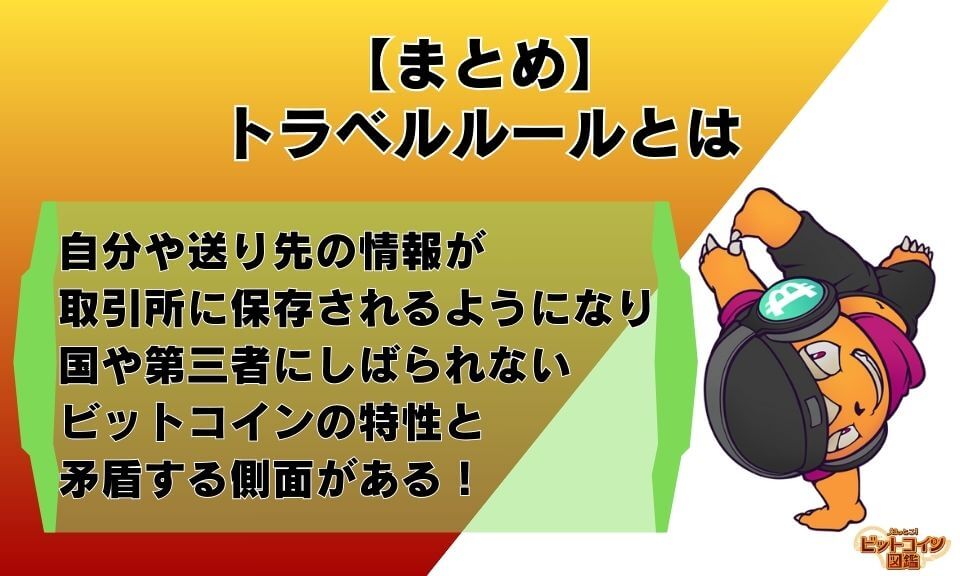
Key Points
- With the introduction of the Travel Rule, it is now required to register sender and recipient information when withdrawing crypto-assets from exchanges, and this information is stored by the exchanges.
- It is no longer possible to send crypto-assets directly between exchanges using different information notification systems.
- Personal and recipient information is stored by the exchange, which contradicts the decentralized nature of Bitcoin.

You can send Bitcoin to exchanges that are affected by the Travel Rule by using a personal wallet as an intermediary.
However, the extra step increases the risk of errors (GOX risk), adds additional fees, and increases waiting time.
It is uncertain whether the Travel Rule will be effective in combating money laundering…
But it is important to note that the Travel Rule increases the risk of information leaks, putting regular users at greater risk.


Bitcoin seems complex and hard to understand, which makes me feel a bit uneasy, but now I want to learn more about it.
Let's learn more about Bitcoin!
Recommended Articles:What is Bitcoin?

Writer:Sigeru Minami
Creator of "Bitcoin-zukan.com."
Active as a handmade craftsman of Bitcoin goods.
